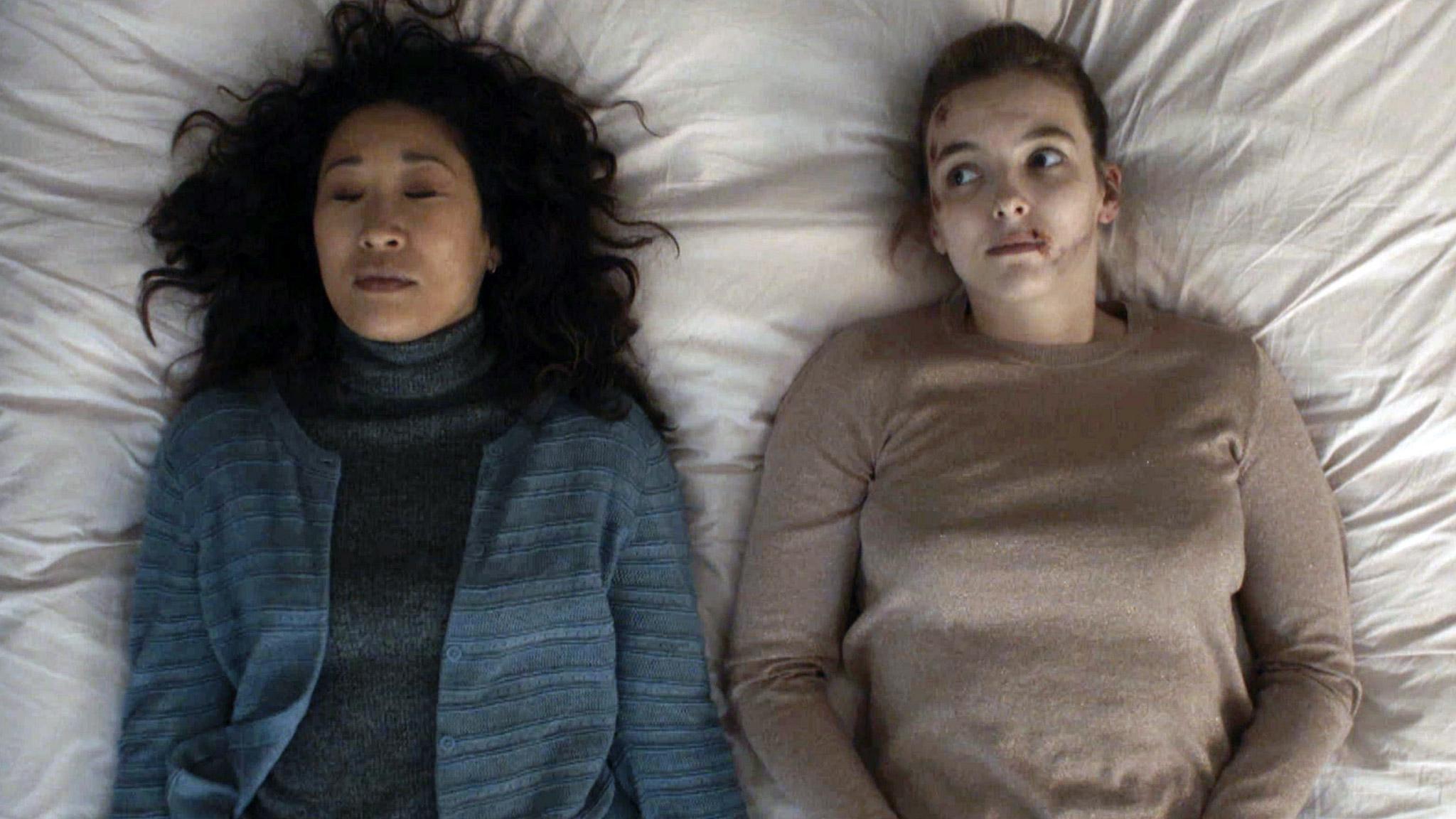Bafta TV Awards: Joan Bakewell on receiving the Fellowship
- Published
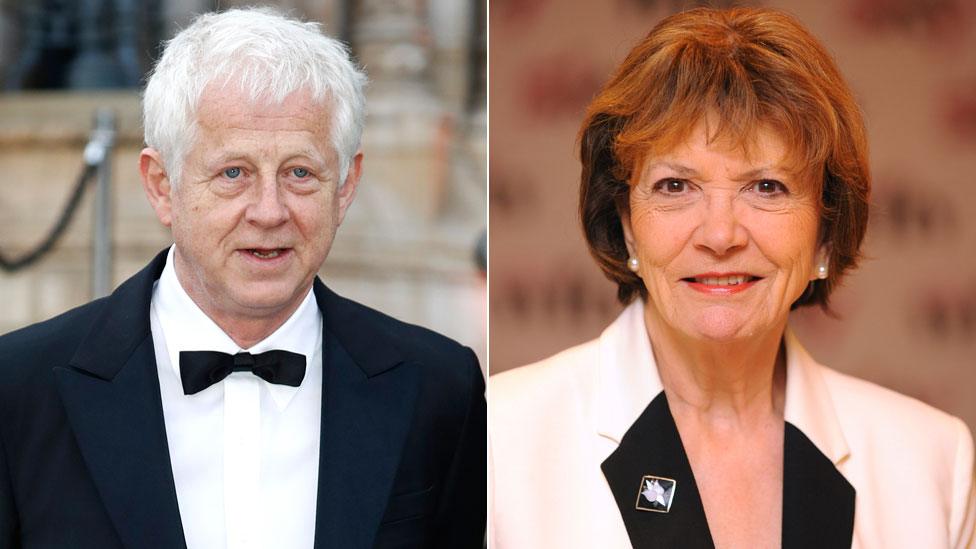
Richard Curtis and Dame Joan Bakewell both came up with the same idea for a BBC TV drama
Joan Bakewell has had a long and distinguished broadcasting career. But, she jokes, her CV would be even more impressive if it weren't for Richard Curtis.
Baroness Bakewell is receiving the Bafta Fellowship - the highest accolade in British broadcasting - on Sunday, after more than 50 years on the airwaves.
But while her writing and broadcasting credits speak for themselves, Baroness Bakewell recalls the one radio project in particular she wished had made it to television.
"I had one or two excursions into drama... and I wrote one about a rather wayward cleric and the adventures and terrible things that went wrong in his parish," she explains to BBC News.
"It was really popular with radio audiences, and they wanted more. And so I thought I'd pitch it for television as well.
"And they said, 'Oh, Joan, that's such a good idea. The trouble is, Richard Curtis has just arrived with The Vicar of Dibley."
The Dawn French series, which revolved around a female vicar arriving in a small English village, was hugely popular when it launched in 1994 and is now regarded as one of the UK's greatest sitcoms.
"So every time I see Richard Curtis now, I always say, 'You destroyed my career,'" Baroness Bakewell laughs.
Nonetheless, her career in broadcasting has been illustrious enough to be recognised by the British Academy, placing the 86-year-old in fine company.
Kate Adie, Jon Snow and Joanna Lumley are among the broadcasters who have received the Fellowship in recent years.
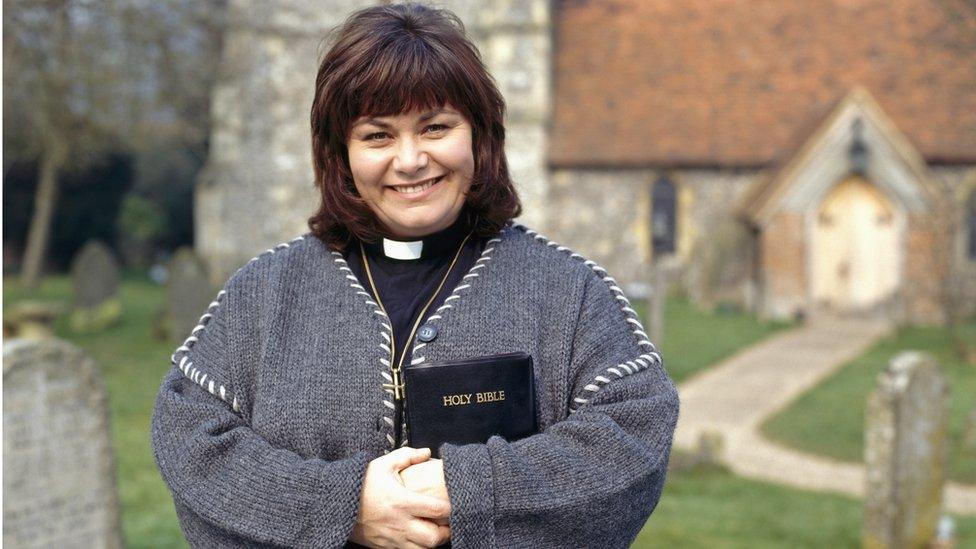
Dawn French starred in The Vicar of Dibley, which was first broadcast in 1994
The Fellowship is one of the only awards to be announced in advance of the ceremony, so the recipient is able to prepare an acceptance speech.
"I have been giving it a lot of thought, of course, because this is a landmark in my life," Baroness Bakewell says.
"And it's a sort of retrospective for me, I think, 'What have I done to deserve all that?' So I have to look up the things that I've done in the past. And so it's been quite nostalgic."
Her presenting roles span several genres - from arts and culture to current affairs, across both radio and television.
"Joan Bakewell isn't easy to pigeonhole," wrote Gary Connor in parliamentary magazine The House, external (she is also a Labour peer).
"A journalist, trailblazing broadcaster, champion of older people, campaigner and politician... she has long been in national treasure territory."
But it hasn't been a career without difficulties.
"I started as a studio manager in radio - which was a hopeless start, I was extremely bad at it... I failed as a chair of several quizzes," she points out.
"It's a career littered with failure, but recovery as well."
Following her stint as a studio manager, Baroness Bakewell found her way into voiceover work after writing to producers whose names she found listed in the Radio Times, and went on to countless presenting roles over several decades.

Joan Bakewell: Life on air
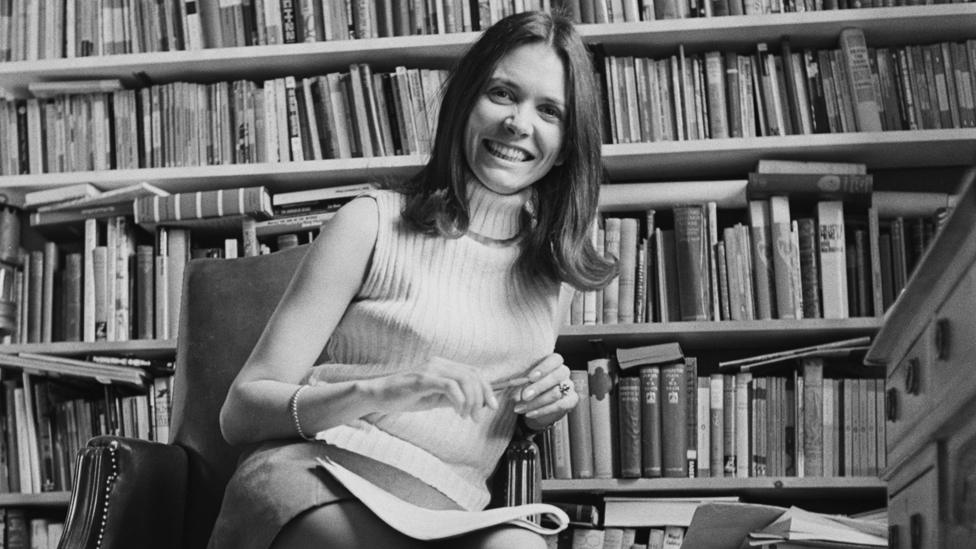
Joan Bakewell pictured in April 1970
Baroness Bakewell's most notable early success was Late Night Line-Up, a discussion programme broadcast on BBC Two in the 1960s.
As the last programme before "shut-down", when the channels went off air overnight, the programme didn't have a scheduled end time, and was popular with viewers precisely because a show could be as long as the presenters felt it needed to be.
She went on to further presenting jobs in the 1970s and 80s with programmes including Granada's consumer affairs show Reports Action and travel programme Holiday.
Baroness Bakewell also served as an arts correspondent for BBC News and chairman of the British Film Institute.
More recently, she has fronted Portrait and Landscape Artist of the Year for Sky Arts and become the president of Birkbeck, University of London. She was made a Dame in 2008, external

A look down the list of this year's nominees at the TV Baftas gives pause for thought on just how much has changed in the television industry since Dame Joan became a presenter.
This year's most nominated show, for example, is Killing Eve - a series which, despite being broadcast weekly, was made available in its entirety on the BBC iPlayer after its first episode aired.
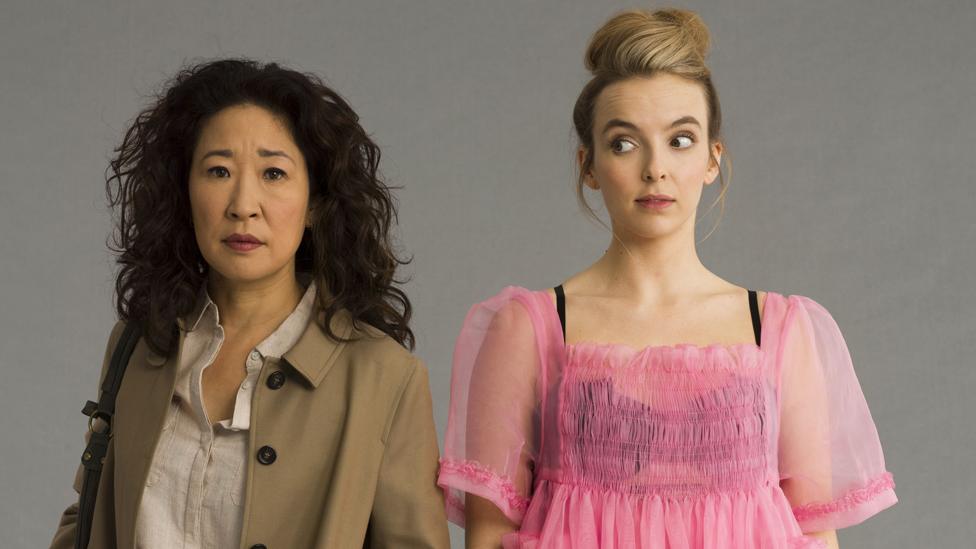
Streaming shows at one's leisure is certainly the most seismic change there has been in TV since its inception.
"It's part of the fragmenting of life," Baroness Bakewell says.
"There was a time when we all rushed home in time to see a certain programme. And I remember That Was The Week That Was - a great comedy on Saturday night about the week's events.
"And I remember going to the theatre on the Saturday to see a play and went backstage because I knew one of the actors.
"He came rushing out of this dressing room saying, 'Darling, wonderful to see you. I've got to get home or I'll miss That Was The Week That Was!' [There was] no iPlayer."
Presenter progress
In the 1970s, when Dame Joan and Susannah Simons presented Radio 4's PM together, it was the first time a BBC current affairs show had been fronted by two women.
Both asked that no attention was drawn to that fact at the time, and Baroness Bakewell stresses the whole point was that such things shouldn't be notable.
Getting more women on the airwaves is an issue she's been vocal about since. But that is something which has dramatically improved in recent years.
At the BBC, recent presenter appointments include Fiona Bruce (on Question Time), Zoe Ball (the Radio 2 Breakfast show) and Sara Cox (Radio 2 Drivetime), Jo Coburn (Politics Live), Martha Kearney (the Today programme), while Emily Maitlis now heads an all-female presenting team on Newsnight.
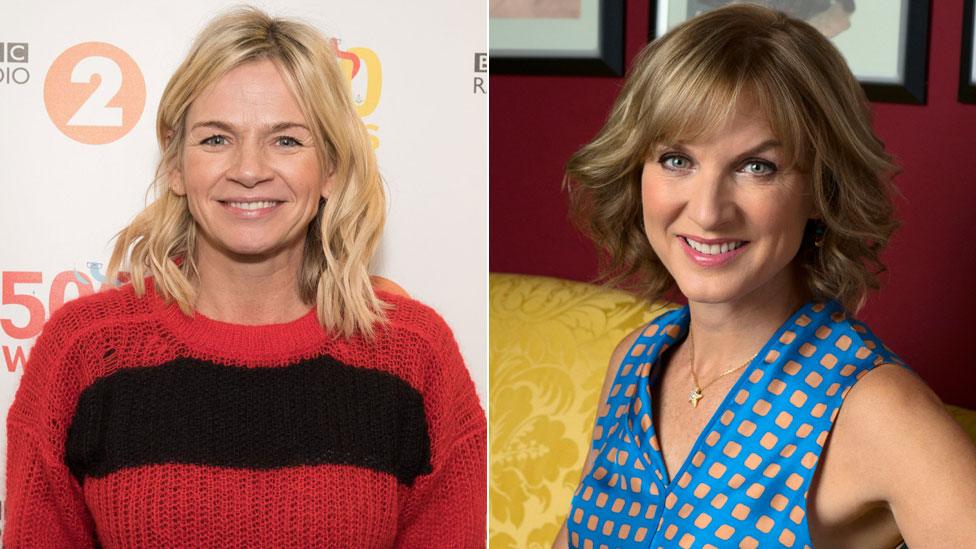
Zoe Ball and Fiona Bruce are among recent appointees to high-profile presenting gigs
In addition to some of the BBC's biggest entertainment shows like Strictly Come Dancing being fronted by women, does Baroness Bakewell feel equality is finally being reached?
"Yes, in principle, that is the case," she replies.
"But of course, as I've grown older, I've moved my loyalty and my concern to older women. And so I have always campaigned for the faces of older women to be on TV, particularly on the news.
"Not me, I never want that job. I've never campaigned for anything that I actually wanted myself, I thought 'that's not fair'. But it's the principle of it.
"Indeed, when I was on the House of Lords Communications Committee, they were saying, 'Now what really should we explore?' And I said, 'Well, what about older women and current affairs?' And they said, 'No, no, surely that battle has been won long ago? And I said, 'That's why we need to look at it.'"
Given that she considers her career one "littered with failure", is there anything she regrets doing?
"Oh no, nothing's wasted," she replies. "It teaches you that life's unfair.
"There was no reason that my little comedy series shouldn't have transferred to drama, except for the fact that there was Richard Curtis, brilliant writer, ahead of me in the queue.
"So I mean, I can't hold myself responsible for that. I didn't blame myself. I blame destiny. And Richard Curtis, of course."
- Published28 March 2019
